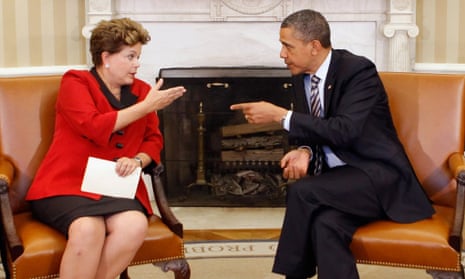First it was there. Then it was gone. The long-awaited announcement of Brazil’s new climate target came and went with a sleight of hand that caused an uproar among environmentalists this week.
But rather than signalling a shift in policy, as some had feared, the sudden appearance and disappearance of the country’s CO2 reduction goals appears to have more to do with diplomatic mistakes, realpolitik priorities and the greater importance of the US than China, the Guardian has learned.
The plan to set a ceiling on carbon dioxide emissions first appeared in the draft of a joint climate statement from Brazil and China ahead of a meeting between Brazilian president Dilma Rousseff and Chinese premier Li Keqiang.
That text included the much-anticipated goal: “Brazil has announced its intention to establish an upper limit to its emissions by 2030.”
But these sentences had been dropped when the final version was posted on the Foreign Ministry website after the talks, prompting consternation among environmental campaigners because Brazil is expected to be an important player at climate talks in Paris later this year.
Alfredo Sirkis, the chair until last year of the Joint Committee on Climate Change of the National Congress, claimed that Rousseff eliminated the target and watered down Chinese proposals for a partnership on solar energy.
On the website of the Climate Observatory , a coalition of more than 20 NGOs, Sirkis argues these actions will hurt Brazil’s global standing.
“Climate change is one of the few major areas where Rousseff still has the power to make a difference,” he wrote. “But she is idiosyncratically hostile to clean energy.”
That may yet prove to be correct. Rousseff, who sat on the board of state oil company Petrobras during her time as energy minister, has made development of pre-salt oil and gas fields the key to the nation’s future development. By comparison, alternative energies such as wind and solar power have seemed far less of a government priority.
But sources have told the Guardian there is another explanation why the target was removed from the statement: Rousseff wants it to be announced at a summit with US president Barack Obama in June.
When the Guardian put this theory to the Brazilian foreign ministry, a spokesman said the change of texts was the result of a “technical problem” rather than a shift in stance.
Either way, Brazil has yet to make its position clear for the upcoming Paris talks. This is unfortunate. South America’s largest economy played a prominent role in recent climate summits. For many years, it won kudos for impressively reducing emissions from deforestation as a result of policies put in place before Rousseff became president.
It has also been a key advocate for emerging economies. As a member of the BASIC group, which includes China, South Africa and India, it opposed emission ceilings for developing nations at Copenhagen in 2009.
China, which has invested heavily in renewable energies and suffered severely from coal pollution, has since changed tack. Last November, in a joint agreement with the United States, Beijing agreed that its emissions should peak by 2030 or earlier.
But Brazil has dragged its heels. Rousseff’s overriding priority is economic growth, and her government – which includes climate sceptic Aldo Rebelo as science minister and agribusiness advocate Kátia Abreu as agriculture minister – says it is still in the process of deciding its targets.
More likely, it seems, is that Rousseff has reasoned, ‘why announce a new climate policy to curry favour with China today, when it can be used to schmooze the United States tomorrow?’

Comments (…)
Sign in or create your Guardian account to join the discussion